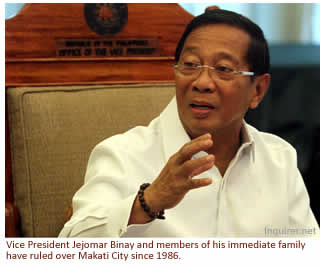 nterior
Secretary Mar Roxas got it exactly right when he told Makati Mayor
Junjun Binay, “you don’t own Makati City.” Roxas was referring to the
mayor’s initial refusal to accept the suspension order
from the Office of the Ombudsman in connection the ongoing corruption
investigation against the mayor. Justice Secretary Leila de Lima chimed
in as well, pointing out that “No public official can treat any local
government unit as his own kingdom and government office as a royal
entitlement.” nterior
Secretary Mar Roxas got it exactly right when he told Makati Mayor
Junjun Binay, “you don’t own Makati City.” Roxas was referring to the
mayor’s initial refusal to accept the suspension order
from the Office of the Ombudsman in connection the ongoing corruption
investigation against the mayor. Justice Secretary Leila de Lima chimed
in as well, pointing out that “No public official can treat any local
government unit as his own kingdom and government office as a royal
entitlement.”

While Roxas and de Lima were referring to a specific issue involving the
Makati mayor, we believe those statements also touch the broader issue
of the way Filipino public officials perceive their elected posts.
Following in the footsteps of former president Ferdinand Marcos—the
father of all corrupt public officials who refused to relinquish power,
many public officials today treat political office.
Article X of the 1986
Philippine Constitution clearly states that “the term of office of
elective local officials, except for barangay (village) officials, shall
be three years and no
such official shall serve for more than three consecutive terms.”
However, wily local officials discovered a way to skirt the term-limit
provision by having their spouses, sons or daughters run for a single
term. That single term gives a term-limited local official the needed
“break in service” that will allow them to run for another three terms
in office. The process can be repeated ad-infinitum thus keeping
province city or municipality in the hands of one family forever. This
clearly violates the spirit of the term-limit law and must be stopped.
From Jejomar Binay and family, or Rodrigo Duterte and family who’ve held
on to the cities of Makati and Davao respectively, to the Ampatuan clan
who control vast regions of Maguindano.

Until the country
finally passes an Anti-dynasty law or any other law to address this
problem, we suggest that language be added to the swearing-in ceremony
of all local officials stating that they recognize that their position
is only temporary and that the city, municipality or province they were
elected to manage is not a personal fiefdom of theirs or their family.
And so they must recognize that they are only temporary stewards the
lands they are about to govern.
This is by no means the
final solution to the problem but a step in the right direction. Because
what better time to remind local officials of the transitory nature of
their office then at their swearing-in ceremony itself.

If you agree with us that
this is a good “first step” that strengthens the term-limits provision
as mandated by the Philippine Constitution, then sign our petition to
add your voice to the clamor for a better tomorrow.
Published 7/3/2015
|